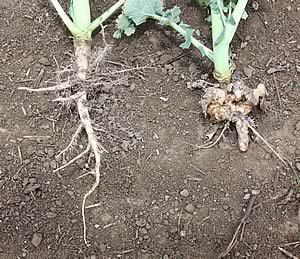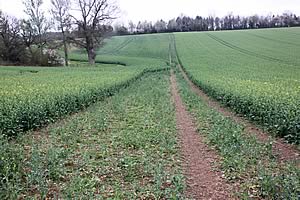2011-04-15
Oilseed rape growers with club root infected land shouldn’t under-estimate the importance of selecting a resistant seed variety to safeguard yields.
Oilseed rape plants infected with club root (right) suffer from a swollen and distorted root which can lead to stunted plants and crop failure.
 |
That is the warning from Beckii Gibbs, Seed Manager for United Oilseeds, who has witnessed first-hand evidence that some growers are still choosing incompatible varieties in failed attempts to boost harvest yields.
Club root affects all cruciferous crops including oilseed rape and can lead to poor establishment if plants become infected early in their development. In severely affected plants, roots can become so swollen by the infection that plants become acutely stunted or killed resulting in complete crop loss.
The disease has become commonplace in Scottish crops where oilseed rape is grown in short rotations, and is becoming more widespread in England and Wales where the disease has spread due to cross-contamination.
“Growers with infected land who choose a non-resistant rapeseed variety in order to chase high yields run the risk of seeing their crops fail,” explains Ms Gibbs. “It is a false economy to sow a non-resistant variety and to invest in fertiliser and chemical inputs in the hope that it will survive the disease.
“In addition, there is no point choosing a variety with a high HGCA gross output rating if that variety subsequently fails to deliver. Instead growers should select either Cracker or Mendel, which despite having a lower HGCA gross output score, are the only varieties which are recommended for use on infected land. Both varieties have proven resistance to club root and will therefore reach their full yield potential on infected land and will return an acceptable yield on investment.”
The crop in the foreground was sown using a non-resistance variety and is flanked by Cracker which has survived the club root infection.
 |
Mendel is recommended for use on a UK-wide scale. Alternatively, growers could choose Cracker which offers a higher yield potential.
Ms Gibbs also warns growers to be particularly careful where oilseed rape follows other brassicas such as swedes and cauliflower. “These crops can spread club root and pass the disease onto oilseed rape further into the rotation,” she explains.
“Growers should routinely check the pH level of their soil to reduce the risk of the disease taking hold. It is also advisable to minimise soil movement on farm equipment from dirty fields to those which are unaffected in order to prevent the disease infecting a wider area of land.”
Crops on poorly-drained ground are particularly susceptible with winter sown crops most likely to be infected immediately post-emergence or from May onwards when soil temperatures start to rise. Raising the pH of the soil to at least 7.2 can help to control the spread of the disease, as can extending the rotation to introduce a break of at least four years between brassicas. However, resting spores can survive in soil for many years with problems re-occuring after 10-20 years where soil infection is high.
 Carrot Clip Cuts Sclerotinia Risk Carrot Clip Cuts Sclerotinia Risk
 GDVI Scanning Highlights Modern Hybrid OSR Vigour Advantages GDVI Scanning Highlights Modern Hybrid OSR Vigour Advantages
 2011 Soil Nitrogen Supply Looks Low 2011 Soil Nitrogen Supply Looks Low

|




